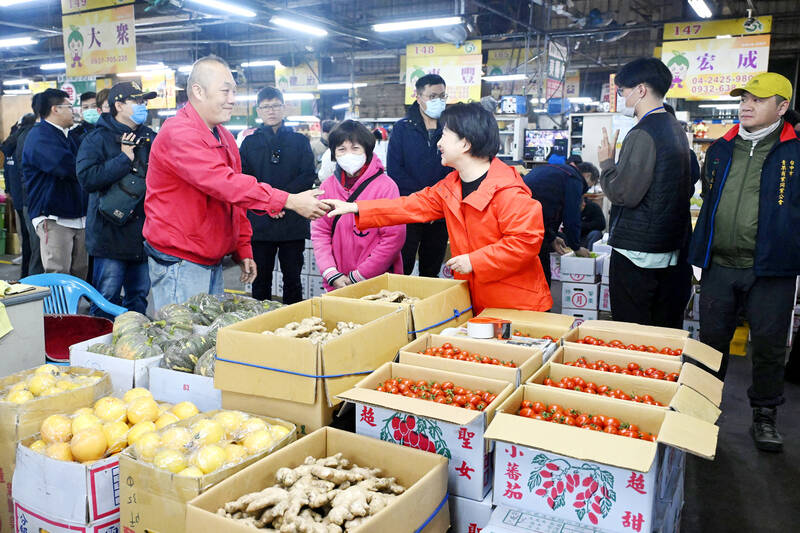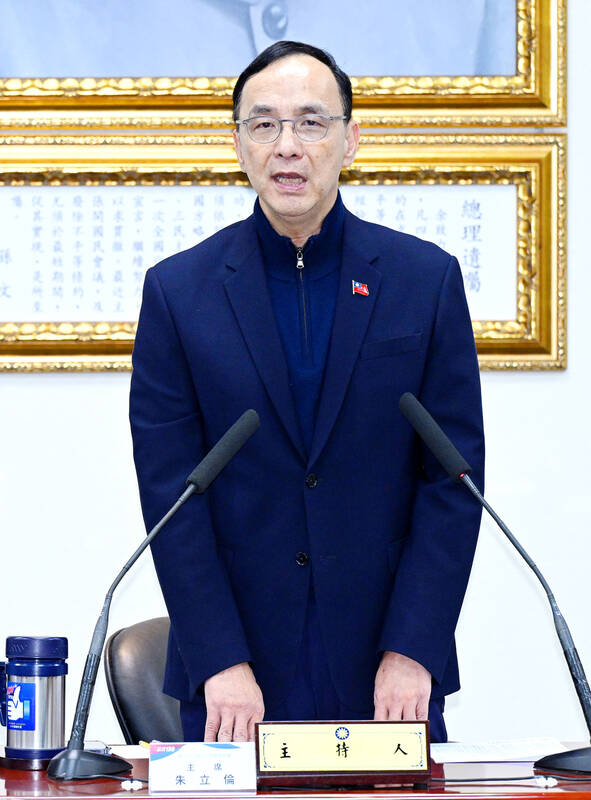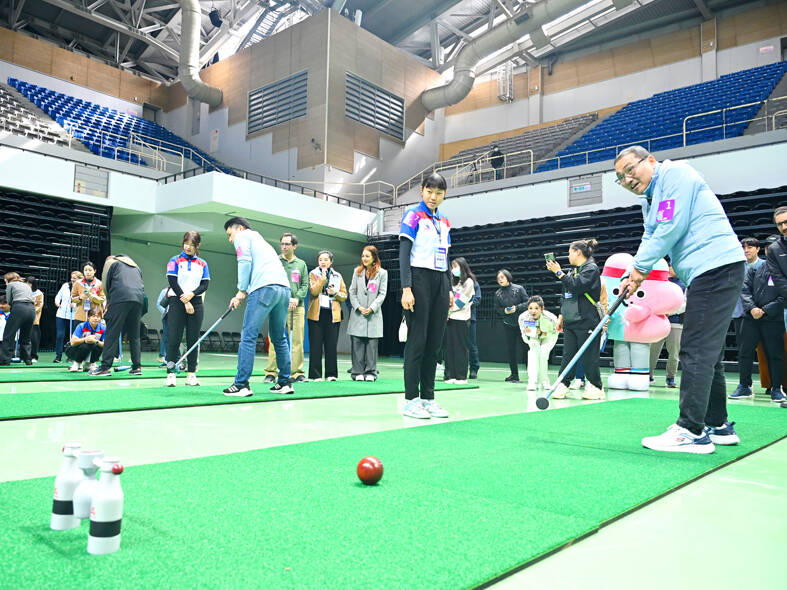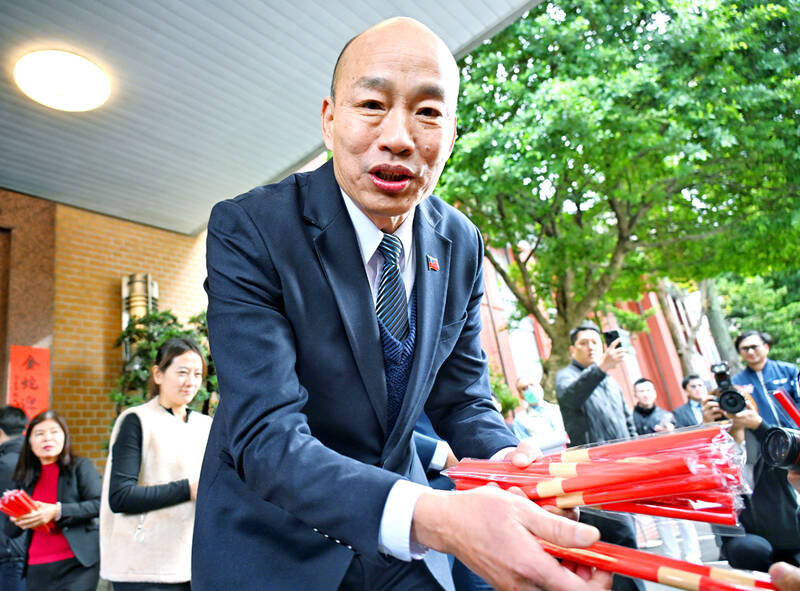In Taiwan’s politics the party chair is an extremely influential position. Typically this person is the presumed presidential candidate or serving president.
In the last presidential election, two of the three candidates were also leaders of their party.
Only one party chair race had been planned for this year, but with the Jan. 1 resignation by the currently indicted Ko Wen-je (柯文哲) of the Taiwan People’s Party (TPP) two parties are now in play.

Photo: Liao Yao-tung, Taipei Times
If a challenger to acting Chairman Huang Kuo-chang (黃國昌) appears we will examine that race in more depth. Currently their election is set for Feb. 15.
EXTREMELY INFLUENTIAL
Likely taking place in late September with the winner taking office in early October, this year’s Chinese Nationalist Party (KMT) chair race is a very big deal. Assuming incumbent Eric Chu (朱立倫) stays in office until then, this will mean he will have completed a full term, which in recent years has been unusual.

Photo: Liao Chen-huei, Taipei Times
Crucially, this makes this year’s election a “real” one in the eyes of KMT politicians because a full four-year term is in the offing. By-elections are usually held after disastrous election losses when the chair is obliged to resign to take responsibility.
The KMT is in better shape than it has been in over a decade and its prospects going forward look decent. It is almost certain that the biggest names and most powerful people behind the scenes are seriously considering a run.
Just by running, major figures will be staking a claim on power in the party, with long-term implications.

Photo: Wang Yi-sung, Taipei Times
The party is structured on Leninist lines, which combined with their traditional Chinese hierarchical culture gives the party chair significant dominance — especially if they win an outright majority. Having grown up in the shadow of the KMT model, other political parties give their leaders similar power.
Speculation has been feverish in the local press following January’s election about who might challenge Chu.
One challenger has declared a run: KMT Central Standing Committee member Sun Chien-ping (孫健萍). Over the years he has appeared about three or four dozen times in pan-blue media outlets China Times and United Daily News and about half that in pan-green Liberty Times (Taipei Times sister newspaper).

Photo: Fang Pin-chao, Taipei Times
Sun is not well known to the public, but likely is better known among the KMT membership, which is more important to his run. He currently remains a long shot and is possibly in the race to strategically build public and press recognition for a future run.
THE INCUMBENT
Though he has not formally declared, it is widely assumed Chu will run. If he wins it will be his third time at the helm.
His first term was a pre-ordained disaster. The political winds had turned into a gale-force hurricane against the KMT in the 2016 election in the wake of the deeply unpopular second term of president Ma Ying-jeou (馬英九), and Chu came across as wishing he could be anywhere else.
His second time around was successful. He has shown himself a strong reformer willing to take bold steps, and outlasted every revolt his reforms triggered.
He has streamlined the party, improved the party’s disastrous financial situation and had some success in making the party more welcoming to younger voters. Though in the last election he failed to win back the presidency, their wins in the legislature meant that after eight years their caucus was no longer impotent.
He also made bold and controversial decisions to eliminate primaries in key races in both 2022 and last year. Though he failed to win as many cities and counties as promised in 2022 and only kept the same number, the losses of Miaoli and Kinmen were small potatoes compared to winning back Taipei and Taoyuan.
He has a strong case to make for re-election that will give challengers pause.
LU SHIOW-YEN
Virtually everyone assumes Taichung Mayor Lu Shiow-yen (盧秀燕) will be the party’s presidential nominee in the January 2028 election. She will be term-limited out as Taichung mayor less than 13 months earlier in December next year.
It is argued that consolidating power in the party around the presidential candidate will ensure clarity and focus on the 2028 race. Proponents suggest that Chu as chairman and New Taipei Mayor Hou You-yi (侯友宜) as the presidential candidate muddled the running of the campaign last year by splitting power, contributing to Hou’s loss.
Opponents note that serving simultaneously as Taichung mayor and Taipei-based party chair would be highly distracting, possibly leading to her doing both jobs poorly. This would make it hard for her to focus on the crucial local elections next year as well as taking the risk that her performance as Taichung mayor would suffer, damaging her currently sky-high popularity and hurting her chances in the 2028 presidential race.
Both arguments have validity and she would probably beat Chu. However, from a strategic standpoint for Lu the risk of a run outweighs the benefits. Chu would be foolish to challenge her in a presidential primary and he knows it.
While not necessarily a huge factor, voters tend not to like dual-role leaders. I suspect Hou doubling as New Taipei City mayor while running for president may have cost him a percentage point or two in the election due to dampened enthusiasm and weakened trust.
Lu cannot afford to risk any percentage points.
HOU YOU-YI
Strategically, if Hou runs for party chair, he has nothing to lose. He lost the last presidential election and will be term-limited out next year.
It is unlikely he would be able to win a presidential primary, and with two terms as the mayor of Taiwan’s largest city, where does he have left to go?
Only two options remain that would not be considered a downgrade: KMT chair or premier. Being the KMT chair would allow him to build support from the KMT presidential candidate, which if this candidate wins would put him in good stead to be named premier.
By all accounts Hou’s relationship with likely nominee Lu is strong, and his pull in the massive New Taipei City electorate would be a strong asset to the party in upcoming elections.
He is also more popular with the public than Chu, though he is less trusted inside the party. If he runs, he’ll lose.
HAN KUO-YU
Legislative Speaker Han Kuo-yu (韓國瑜) remains hugely popular in the party with an almost cult-like base. He would likely have a better shot at challenging Chu than Hou.
Han has already shown interest in the position by running in 2017, though he only came in fourth in a field of six.
Though he may still harbor ambitions for the position, it doesn’t make sense for him to run.
Being the head of one of the five branches of government is a high privilege. Additionally, he has his hands full with that job as the KMT and TPP jointly are working to stymie President William Lai’s (賴清德) agenda.
Even though the speaker is obliged to be neutral (the DPP claims he is not) and he has in theory the tough job of negotiating between the party caucus teams, being KMT chair would likely not give him the same job satisfaction.
Donovan’s Deep Dives is a regular column by Courtney Donovan Smith (石東文) who writes in-depth analysis on everything about Taiwan’s political scene and geopolitics. Donovan is also the central Taiwan correspondent at ICRT FM100 Radio News, co-publisher of Compass Magazine, co-founder Taiwan Report (report.tw) and former chair of the Taichung American Chamber of Commerce. Follow him on X: @donovan_smith.

That US assistance was a model for Taiwan’s spectacular development success was early recognized by policymakers and analysts. In a report to the US Congress for the fiscal year 1962, former President John F. Kennedy noted Taiwan’s “rapid economic growth,” was “producing a substantial net gain in living.” Kennedy had a stake in Taiwan’s achievements and the US’ official development assistance (ODA) in general: In September 1961, his entreaty to make the 1960s a “decade of development,” and an accompanying proposal for dedicated legislation to this end, had been formalized by congressional passage of the Foreign Assistance Act. Two

Despite the intense sunshine, we were hardly breaking a sweat as we cruised along the flat, dedicated bike lane, well protected from the heat by a canopy of trees. The electric assist on the bikes likely made a difference, too. Far removed from the bustle and noise of the Taichung traffic, we admired the serene rural scenery, making our way over rivers, alongside rice paddies and through pear orchards. Our route for the day covered two bike paths that connect in Fengyuan District (豐原) and are best done together. The Hou-Feng Bike Path (后豐鐵馬道) runs southward from Houli District (后里) while the

March 31 to April 6 On May 13, 1950, National Taiwan University Hospital otolaryngologist Su You-peng (蘇友鵬) was summoned to the director’s office. He thought someone had complained about him practicing the violin at night, but when he entered the room, he knew something was terribly wrong. He saw several burly men who appeared to be government secret agents, and three other resident doctors: internist Hsu Chiang (許強), dermatologist Hu Pao-chen (胡寶珍) and ophthalmologist Hu Hsin-lin (胡鑫麟). They were handcuffed, herded onto two jeeps and taken to the Secrecy Bureau (保密局) for questioning. Su was still in his doctor’s robes at

Mirror mirror on the wall, what’s the fairest Disney live-action remake of them all? Wait, mirror. Hold on a second. Maybe choosing from the likes of Alice in Wonderland (2010), Mulan (2020) and The Lion King (2019) isn’t such a good idea. Mirror, on second thought, what’s on Netflix? Even the most devoted fans would have to acknowledge that these have not been the most illustrious illustrations of Disney magic. At their best (Pete’s Dragon? Cinderella?) they breathe life into old classics that could use a little updating. At their worst, well, blue Will Smith. Given the rapacious rate of remakes in modern